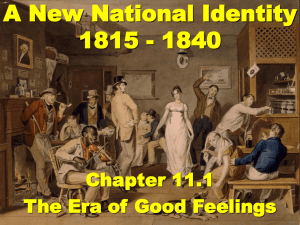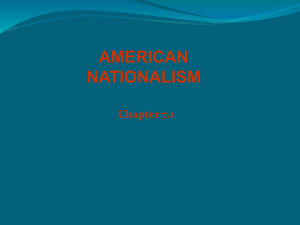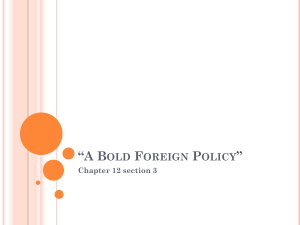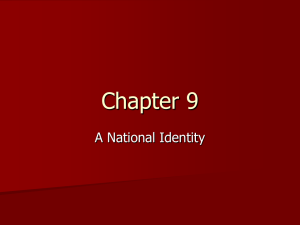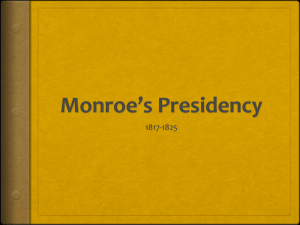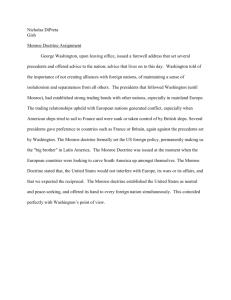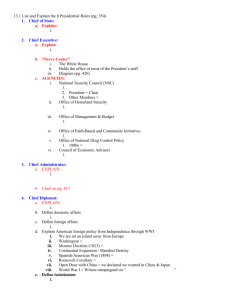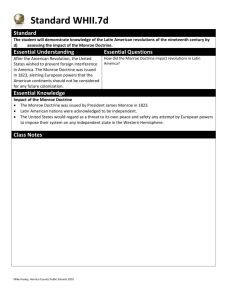Convention of 1818
advertisement
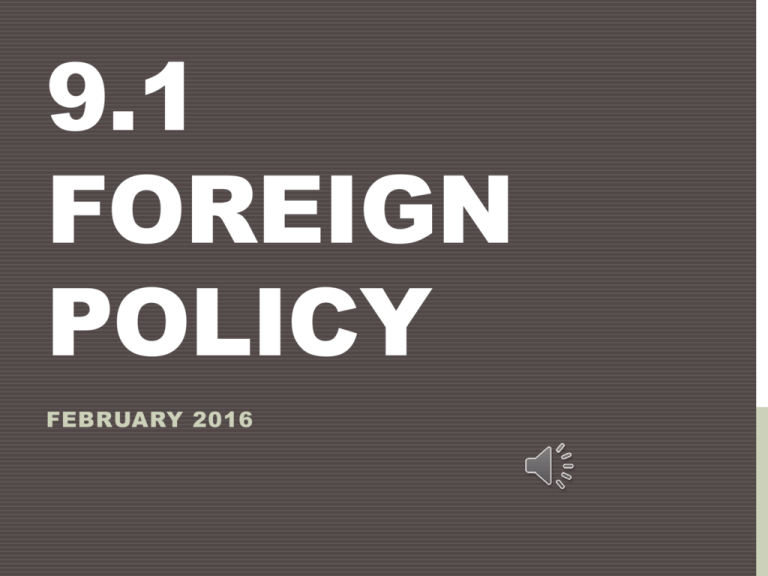
9.1 FOREIGN POLICY FEBRUARY 2016 TAKE NOTES: USE THIS STYLE IF YOU WANT! Rush-Bagot Convention Agreement of 1818 US gains Florida AdamsOnis Treaty Monroe Doctrine SETTLING DISPUTES WITH GREAT BRITAIN • The Treaty of Ghent failed to resolve any of the issues that occurred between GB & the US. • Both wanted access to the Great Lakes region • Rush-Bagot Agreement: limited naval power on the Great lakes for both the US and British Canada • 1-2 vessels per country on each lake • Demilitarized the border and reduced tension btwn the two countries SETTLING DISPUTES WITH GREAT BRITAIN Convention of 1818: 1. set the border between the US and British Canada at 49N latitude as far west as the Rocky Mountains 2. Gave US fishing rights off of Labrador & Newfoundland coast 3. Gave US & GB joint occupation of Oregon territory • Marked the beginning of cooperation between the US & GB US GAINS FLORIDA • US and Spain fighting over Florida • John Quincy Adams sent to negotiate with Spanish diplomat Luis de Onis • Goals: 1. End Seminole raids in Georgia 2. Clearly define border between Louisiana Purchase & Spanish Mexico • Monroe sent troops to secure the border just in case (knew that Spain was weakened by Napoleonic Wars) – led by Jackson FIRST SEMINOLE WAR • At the same time, Seminole Indians from Florida were at conflict with Americans US Perspective Spanish Perspective Seminole NA’s were helping runaway slaves & raiding US settlements in Georgia Americans moved into Spanish lands in Florida without permission to gain NA’s fertile land • First Seminole War: Jackson invaded Florida (w/o Monroe’s support) to capture Seminole Raiders • Outcomes: • • • Took over Spain’s military posts in Florida Overthrew the Governor of Florida Fast-tracked negotiations w/ Spain US GAINS FLORIDA • Jackson was praised by Americans and Adams – believed that Spanish weren’t doing a good enough job controlling the Native Americans • The First Seminole War convinced Spanish leaders to negotiate with the US over Florida (and their colonies were weakened due to revolts) • Adams-Onis Treaty (1819): settled border disputes between Spanish Mexico & US • • • • Established boundary between Mexico & US Spain gave Florida to US US gave up claims to Texas US forgave $5 million in claims & given to the US LEADING TO THE MONROE DOCTRINE • Simon Bolivar led Spanish colonies in their struggle for independence • Mexico broke free from Spain in 1821, worrying Monroe • Felt that European powers (such as Russia!!!) would try to take over Latin American countries • Both US & GB claimed some control of Latin America – intervened in matters when US interest was at stake. • US motive: GB & US issued joint agreement that would warn the rest of Europe to stay out of Latin America Great Britain MONROE DOCTRINE • Adams and Monroe issued the Monroe Doctrine in 1823 • 4 basic points: 1. US would not interfere in the affairs of European nations 2. US would recognize, and not interfere with, European colonies that already existed in North and South America 3. Western Hemisphere was to be off-limits to future colonization by any foreign power 4. US would consider any European power’s attempt to colonize or interfere in the West to be a hostile act Fun Fact: In 1962, the Monroe Doctrine was invoked symbolically when the Soviet Union began to build missile-launching sites in Cuba. With the support of the Organization of American States, President John F. Kennedy threw a naval and air quarantine around the island. After several tense days, the Soviet Union agreed to withdraw the missiles and dismantle the sites. 9.1 CONTENT QUESTIONS 1. Explain the Rush-Bagot Agreement and why it was created. 1. What was decided at the Convention of 1818? 2. Why was the First Seminole war started? What was its outcome? 3. The Monroe Doctrine dealt with what countries? 4. What were the 4 main points of the Monroe Doctrine? (in your own words)
